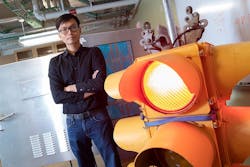Indiana DOT, Purdue developing safety solution for signalized intersections
Purdue University and the Indiana Department of Transportation (INDOT) are developing technology to improve safety for motorists approaching high-speed traffic signals.
According to a news release from Purdue, transportation researchers at Purdue's Joint Transportation Research Program at the Lyles School of Civil Engineering are collaborating with INDOT on this project.
The technology is meant to address "dilemma zones," the name given to the section of roadway upstream of an intersection where a vehicle can neither stop safely nor clear an intersection at its present speed. Purdue's research engineer Jijo Mathew said a driver's decision to stop at a traffic signal or continue through it is made at the onset of the traffic signal turning yellow.
The invention extends green time or indicates yellow early as necessary at traffic signals to ensure safety and efficiency to the next intersection on a 0.1-second basis. The system would consider the trajectory of each vehicle relative to a predetermined time of when the green would end. If there is enough time to spare, the green is extended until the vehicle clears the intersection. However, when there are other vehicles competing for green time on other movements, the system would indicate yellow early before the vehicle enters the dilemma zone for a safe stop, Purdue says.
The technology uses wireless communication devices placed at traffic signals and in vehicles, and specialized control logic at the signal controller to bring it all together.
The research team tested the technology during brief sessions over a period of a week at County Road 500 S. at U.S. Highway 231 in Tippecanoe County, Indiana. Researchers said the tests showed the technology has the potential to reduce heavy vehicle red-light incursions by a significant amount.
More information about the project can be found on Purdue's website.
------------
SOURCE: Purdue University
